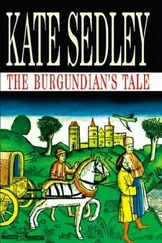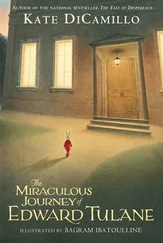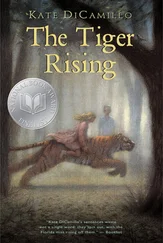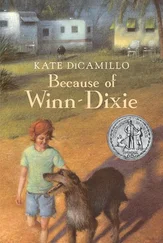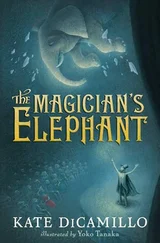“Yes,” muttered Roscuro. “Yes. That is exactly what I intend to do. I will make the princess suffer for how she looked at me.”
And as Roscuro worked and planned, the jailer Gregory held tight to his rope and made his own way through the darkness, and in a dank cell, the prisoner who had once had a red tablecloth and now had nothing, spent his days and nights weeping quietly.
High above the dungeon, upstairs, in the castle, a small mouse stood alone one evening as his brothers and sisters sniffed for crumbs. He stood with his head cocked to one side, listening to a sweet sound he did not yet have a name for. There would be consequences of the mouse’s love for music. You, reader, know already some of those consequences. Because of the music, the mouse would find his way to a princess. He would fall in love.
And speaking of consequences, the same evening that Despereaux stood inside the castle hearing music for the first time, outside the castle, in the gloom of dusk, more consequences drew near. A wagon driven by a king’s soldier and piled high with spoons and bowls and kettles was making its way to the castle. And beside the soldier there sat a young girl with ears that looked like nothing so much as pieces of cauliflower stuck on either side of her head.
The girl’s name, reader, was Miggery Sow. And though she did not yet know it, she would be instrumental in helping the rat work his revenge.
End of the Second Book
Book the Third
GOR! THE TALE OF MIGGERY SOW
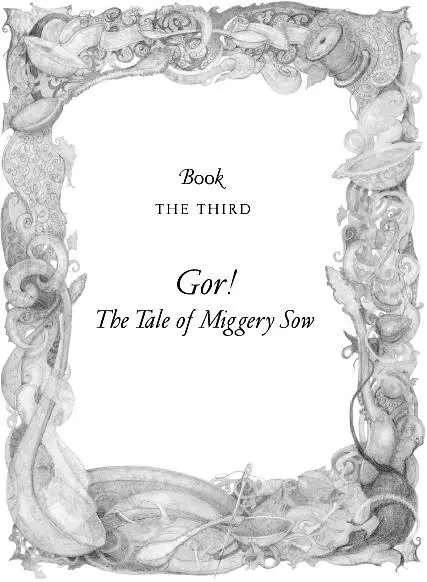

AGAIN, READER, we must go backward before we can go forward. With that said, here begins a short history of the life and times of Miggery Sow, a girl born into this world many years before the mouse Despereaux and the rat Chiaroscuro, a girl born far from the castle, a girl named for her father’s favorite prize-winning pig.
Miggery Sow was six years old when her mother, holding on to Mig’s hand and staring directly into Mig’s eyes, died.
“Ma?” said Mig. “Ma, couldn’t you stay here with me?”
“Oh,” said her mother. “Who is that? Who is that holding my hand?”
“It’s me, Ma, Miggery Sow.”
“Ah, child, let me go.”
“But I want you to stay here,” said Mig, wiping first at her runny nose and then at her runny eyes.
“You want,” said her mother.
“Yes,” said Mig, “I want.”
“Ah, child, and what does it matter what you are wanting?” said her mother. She squeezed Mig’s hand once, twice, and then she died, leaving Mig alone with her father, who, on a market day in spring soon after his wife’s death, sold his daughter into service for a handful of cigarettes, a red tablecloth, and a hen.
“Papa?” said Mig, when her father was walking away from her with the hen in his arms, a cigarette in his mouth, and the red tablecloth draped across his shoulders like a cape.
“Go on, Mig,” he said. “You belong to that man now.”
“But I don’t want to, Papa,” she said. “I want to go with you.” She took hold of the red tablecloth and tugged on it.
“Lord, child,” her father said, “and who is asking you what you want? Go on now.” He untangled her fingers from the cloth and turned her in the direction of the man who had bought her.
Mig watched her father walk away, the red tablecloth billowing out behind him. He left his daughter. And, reader, as you already know, he did not look back. Not even once.
Can you imagine it? Can you imagine your father selling you for a tablecloth, a hen, and a handful of cigarettes? Close your eyes, please, and consider it for just a moment.
Done?
I hope that the hair on the back of your neck stood up as you thought of Mig’s fate and how it would be if it were your own.
Poor Mig. What will become of her? You must, frightened though you may be, read on and see for yourself.
Reader, it is your duty.

MIGGERY SOW called the man who purchased her Uncle, as he said she must. And also, as he said she must, Mig tended Uncle’s sheep and cooked Uncle’s food and scrubbed Uncle’s kettle. She did all of this without a word of thanks or praise from the man himself.
Another unfortunate fact of life with Uncle was that he very much liked giving Mig what he referred to as “a good clout to the ear.” In fairness to Uncle, it must be reported that he did always inquire whether or not Mig was interested in receiving the clout.
Their daily exchanges went something like this:
Uncle: “I thought I told you to clean the kettle.”
Mig: “I cleaned it, Uncle. I cleaned it good.”
Uncle: “Ah, it’s filthy. You’ll have to be punished, won’t ye?”
Mig: “Gor, Uncle, I cleaned the kettle.”
Uncle: “Are ye saying that I’m a liar, girl?”
Mig: “No, Uncle.”
Uncle: “Do ye want a good clout to the ear, then?”
Mig: “No, thank you, Uncle, I don’t.”
Alas, Uncle seemed to be as entirely unconcerned with what Mig wanted as her mother and father had been. The discussed clout to the ear was always delivered . . . delivered, I am afraid, with a great deal of enthusiasm on Uncle’s part and received with absolutely no enthusiasm at all on the part of Mig.
These clouts were alarmingly frequent. And Uncle was scrupulously fair in paying attention to both the right and left side of Miggery Sow. So it was that after a time, the young Mig’s ears came to resemble not so much ears as pieces of cauliflower stuck to either side of her head.
And they became about as useful to her as pieces of cauliflower. That is to say that they all but ceased their functioning as ears. Words, for Mig, lost their sharp edges. And then they lost their edges altogether and became blurry, blankety things that she had a great deal of trouble making any sense out of at all.
The less Mig heard, the less she understood. The less she understood, the more things she did wrong; and the more things she did wrong, the more clouts to the ear she received, and the less she heard. This is what is known as a vicious circle. And Miggery Sow was right in the center of it.
Which is not, reader, where anybody would want to be.
But then, as you know, what Miggery Sow wanted had never been of much concern to anyone.

WHEN MIG TURNED SEVEN years old, there was no cake, no celebration, no singing, no present, no acknowledgment of her birthday at all other than Mig saying, “Uncle, today I am seven years old.”
And Uncle saying in return, “Did I ask ye how old you were today? Get out of my face before I give ye a good clout to the ear.”
A few hours after receiving her birthday clout to the ear, Mig was out in the field with Uncle’s sheep when she saw something glittering and glowing on the horizon.
She thought for a moment that it was the sun. But she turned and saw that the sun was in the west, where it should be, sinking to join the earth. This thing that shone so brightly was something else. Mig stood in the field and shaded her eyes with her left hand and watched the brilliant light draw closer and closer and closer until it revealed itself to be King Phillip and his Queen Rosemary and their daughter, the young Princess Pea.
Читать дальше







